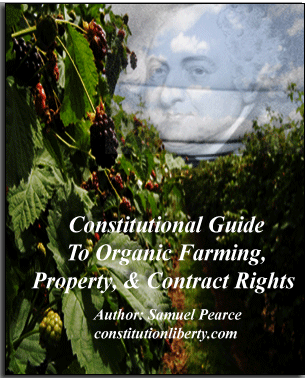



|
This book contains the political philosophy of the Founding Fathers regarding property, contracts, land, and farming. The Founding Fathers believed that it was necessary to restrict the powers delegated to the federal government under the Constitution in order to protect the rights of an individual to exclusive possession of property, which in the Founders minds meant everything to which they could attach a value—including freedom of opinions, ideas, speech, and commerce. It places at your fingertips informative quotes, references, and excerpts from the writings of the Founders themselves and from other sources to give a background and context to the concepts that went into the framing of the U.S. Constitution.
Chapter 1 - Founding Fathers Quotes on Organic Farming, Property, & Contract Rights.
The Founding Fathers believed that it was necessary to restrict the powers delegated to the federal government under the Constitution in order to protect the rights of an individual to exclusive possession of property, which in the Founders minds meant everything to which they could attach a value—including freedom of opinions, ideas, speech, and commerce.
To build a model for balancing the powers reserved to the individual states with the powers delegated to the federal government, Thomas Jefferson, John Adams, James Madison, and Alexander Hamilton studied the successes and failures of earlier forms of federation, including the leagues formed by the ancient Greek city-states, the Roman Empire, and the leagues formed by Germanic tribes, Swiss cantons, and Dutch republics up through the middle ages. Their study of history gave the Founding Fathers a unique perspective on the rights of individuals regarding property ownership.
Chapter 2 - James Madison and Noah Webster - Property
In the view of the Founding Fathers, the purpose of government was to protect the private property of all citizens. The definition of powers delegated to the federal government under the U.S. Constitution served this purpose. However, as illustrated by the writings of James Madison in this chapter, the Founders’ definition of the “property” that needed to be protected included not just the concrete physical objects that are commonly thought of as property, such as land, goods, or money.
Chapter 3 - The Second Treatise of Civil Government & Property
The Second Treatise of Civil Government written by John Locke also dealt with the importance of property rights. Locke believed that, although the earth was given by God to all mankind in common, without labor, the earth’s resources are of no use. Only hard work and industry can transform these gifts into something useful. God grants the right of individual ownership to those who take the earth’s resources out of their natural state. Thus, the common rights to natural resources cannot be restricted, but when labor is invested to take resources out of the natural state for the purposes of creating and producing value, the resource becomes the property of the individual.
.
ISBN # 978-1468106558
Cost: $9.99
Size: 10 x 8 x 0.2 inches
Available at Amazon.com, constitutionliberty.com, and Kindle
MORE CHAPTERS - ORDER AT AMAZON ....
|